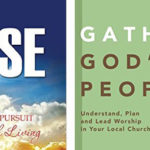Making the Good News Good Again: Recovering the Wonder of the Gospel by Judson Edwards (Smyth & Helwys)
Near the end of Making the Good News Good Again, Judson Edwards observes he has written a book about revival. He says: “I’m envisioning a personal revival where people who have been Christians for a long time recover the wonder of the gospel, become one of the blessed, and start to experience the joy of their salvation.”
He got that right. Making Good News Good Again is a conversation about revival, initiated by a careful and compassionate observer of the Christian spirit. Edwards’ honesty about the trials and travails of trying to live the faith—particularly what Chris-tians do to diminish each other—rings true. As I read this book, I couldn’t help but think about its timeliness, coming to us when countless Christians are disheartened by church conflict, dispirited by the fatigue of doing good and discouraged by a faltering economy. Yet Edwards’ faithful patience provides new lenses for seeing the Christian life in a broader perspective, as well as for reminding us of the divine interconnection between grace and joy.
Edwards, pastor of Woodland Baptist Church in San Antonio, mines good news from both the Old and New Testaments. Even if you’re reserved and clumsy, you won’t be able to read his description of King David’s parade-dance before the Ark of the Covenant without wanting to dance for joy yourself. His study of Romans 8 provides glad-hearted food for a feast of thought. And his contemplation on Martin Luther’s description of God as left-handed is insight to savor.
Finally, one personal note: Edwards’ uncle, Glen Edwards, was an amazingly gracious friend, pastor and guide to countless Christians whose lives were turned outward and upward by his gentle wisdom and encouragement. With Making Good News Good Again, Jud Edwards stands shoulder-to-shoulder with his Uncle Glen as a mentor and encourager.
Marv Knox, editor
Baptist Standard
Dallas
Sign up for our weekly edition and get all our headlines in your inbox on Thursdays
A Capsule History of Baptist Principles by William H. Brackney and Baptist History & Heritage Society Historical Dictionary of the Baptists, Second Edition by William H. Brackney (Scarecrow Press)

|
Published to coincide with Baptists’ 400th anniversary, William Brackney has contributed two valuable volumes—a brief, introductory summary of Baptist principles set in historical perspective and a comprehensive reference work.
In his slender book outlining Baptist principles, Brackney begins—quite appropriately—with the foundational belief in the Lordship of Jesus Christ. He observes the Christ-centered approach affects Baptists’ theology, ethics and polity.
Because Jesus is Lord, Baptists believe the Scriptures that bear witness of him. So, Baptists follow Scripture rather than church traditions or manmade creeds when it comes to their understanding of believer’s baptism by immersion and observance of the Lord’s Supper as a symbolic memorial.
Because Jesus is Lord, Baptists recognize the inherent worth of every person and the need for all people to enter into a personal relationship with God through Christ. So, Baptists believe in experiential religion, treasure religious liberty for all people, value human rights and follow a missionary imperative.
And because Jesus is Lord, Baptists believe in a gathered believers’ church with Christ as its head. So, Baptists believe in the autonomy of each congregation, the importance of the associational principle and the value of voluntary cooperation for advancing kingdom work.

|
This book would serve as a helpful guide for a new members’ class, for a churchwide study or for individual instruction.
Brackney’s other major contribution, an updated historical dictionary of Baptists, covers the worldwide Baptist movement from A to Z—Canadian Baptist William Aberhart to the Zionitic Brotherhood.
As former Baptist World Alliance General Secretary Denton Lotz writes in the book’s preface: “Although it is a dictionary in the sense of defining terms and names of outstanding Baptists, it is more than a dictionary. It is a history of Baptists in alphabetical order!”
Even the most comprehensive reference work omits what some might consider key items. For instance, it seems odd that Brackney includes entries on Adrian Rogers, Paige Patterson and Paul Pressler, but nothing on W.A. Criswell. The “Leg of Mutton Baptists” merit an entry, but R.C. Buckner doesn’t.
But these are minor flaws that do not diminish the value of this important work that should be in every Baptist pastor’s study and on the shelves of every church library.
Ken Camp, managing editor
Baptist Standard
Dallas














We seek to connect God’s story and God’s people around the world. To learn more about God’s story, click here.
Send comments and feedback to Eric Black, our editor. For comments to be published, please specify “letter to the editor.” Maximum length for publication is 300 words.